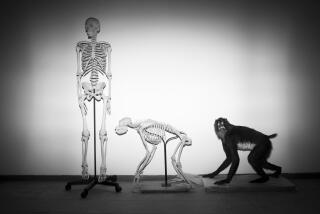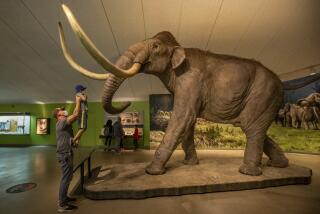Ancient Climate Changes Linked to Human Evolution : Science: Experts say cold, dry spells may have doomed some hominid species and forced others to migrate.
- Share via
Off the coast of Africa, a Columbia University expert has discovered the first detailed evidence of ancient climate changes that, like an implacable hand of fate, may have spurred human evolution.
No one knows for certain what first forced humanity’s remote apelike ancestors to forsake the trees they called home, why some pre-human species surpassed others, or why primitive human ancestors migrated out of their African homeland. There are, experts say, as many theories as there are fossils.
But the new research suggests that weather may be at the root of the human family tree.
An analysis of ocean sediments made public Thursday shows that in the past 3 million years, the cradle of humankind in East Africa was rocked three times by abrupt cycles of colder, drier climate. Each cycle of change coincided with the demise of some pre-human species and the development of those who became the forebears of modern humanity.
The finding by climate authority Peter deMenocal at Columbia’s Lamont-Doherty Earth Observatory is a “wonderful development” that buttresses a controversial theory of the intimate connection between the African climate and human origins, several experts said.
Frank Brown, dean of earth sciences at the University of Utah, called the discovery “tremendously important.” The research was published in the journal Science.
The sediment core samples document dramatic climate changes in East and West Africa starting about 2.8 million years ago, when the ancient human family tree apparently split into two branches. They show a second equally abrupt change about 1.7 million years ago, at the time that humanity’s most immediate direct ancestor first appeared, according to fossil records. A third shift was detected at about 1 million years ago, around the time when many experts believe that humanity’s predecessors started to migrate out of Africa, to eventually populate the world.
“We can now place the fossil record of human development within the context of very detailed records of how African climate changed during the period of evolution,” deMenocal said.
*
The ebb and flow of massive ice sheets in North America and Europe most likely altered the long-term weather patterns in Africa, experts said. Researchers can measure those changes by analyzing concentrations of dust blown from the interior of the continent and settling in the depths of the Gulf of Aden and other ocean sites.
The northern ice sheets could have lowered sea surface temperatures around Africa dramatically, by as much as 20 degrees, and reduced rainfall by more than 30%. As a result of the prolonged arid conditions, ground cover across Africa was sparser and allowed more topsoil to be blown away. The layers of wind-blown dust that accumulated during times when glaciers covered much of Europe and North America were up to five times thicker than during warmer periods, the undersea sediments show.
With each cycle, the warm, wet regions of Africa became so cool and dry that lush rain forests gave way to arid savannas. Animals and hominids, as humanity’s early ancestors are called, were forced to adapt or die.
When rain forests withered in one of the earliest cold spells, for example, pre-human species could have been forced out of the trees they called home and begun walking upright as they foraged for new sources of food. Millions of years later, a drier climate could have so depleted food supplies that humanity’s ancestors were forced to migrate to Europe and Asia.
Yale University anthropologist Elizabeth Vrba, who has championed the link between climate change and human evolution for almost 20 years, said the new finding gave her “a very positive feeling.”
“We have had the hypothesis that climate has been active in promoting evolution for a long time. There are many in the field who doubt that African climates changed enough to force evolution. They say we don’t have enough data,” she said.
“It is hard now for critics to say nothing happened,” she said. “The evidence is mounting up.”
Others, however, cautioned that there is not yet enough information to show a conclusive link between climate and human evolution.
“My own bias,” added Brown, “is that we need more darned good fossils of early man, particularly between 2.5 and 2.8 million years ago.”
*
Tim D. White, a paleontologist at UC Berkeley’s Laboratory for Human Evolutionary Studies, is working with deMenocal to match the climate, as recorded in ocean sediments, with extremely ancient hominid fossils White discovered that date from the time humanity’s ancestors first branched from the African apes.
White, an expert on early human origins, has mixed feelings about efforts to correlate the climate information gleaned from core samples with the pace of human development. The search is complicated by disagreements over how to date some fossils, the sparsity of fossil remains and an overriding uncertainty concerning just when some species may have appeared or disappeared, he said.
“Understanding how climate affected mammalian evolution is a formidable undertaking,” he said. “The hominid fossil record is not complete enough to test any hypothesis linking hominid origins to global climatic change.”
At a time when researchers are debating the effects of global warming and depletion of the Earth’s protective ozone layer, the newest insight into humanity’s past offers a sobering thought about the risks it may face in the future, deMenocal mused.
“There are people who theorize that the genus Homo was brought into this world by a change in climate,” deMenocal said. “If climate was a factor in selecting for characteristics that defined the genus Homo, then a significant change in climate might also lead to our extinction as well.”
(BEGIN TEXT OF INFOBOX / INFOGRAPHIC)
Chilling Humanity’s Cradle
Profound climate shifts in Africa may have changed the course of human evolution. by analyzing ocean sediments, a Columbia University researcher demonstrated that ancient Africa suffered cycles of colder, drier climate about 2.8 million, 1.7 million and 1 million year ago, coinciding with what appear to be major steps in human development. The climate changes may have contributed to the extinction of some human ancestral species, while allowing other to thrive.






